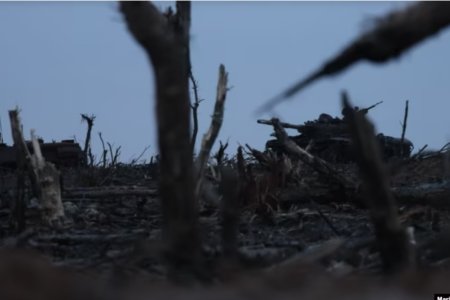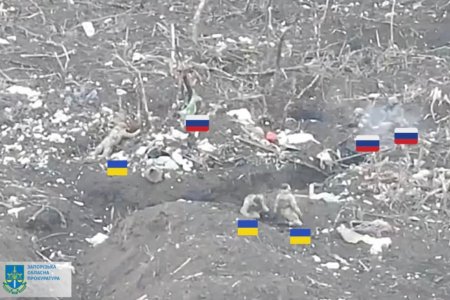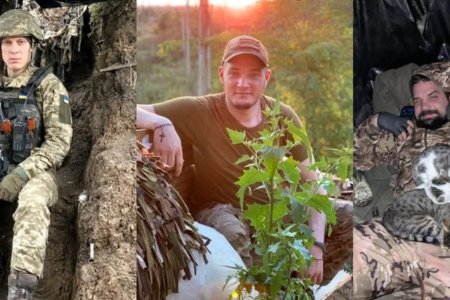
Ukraine’s Prosecutor General has initiated a criminal investigation into the latest evidence that Russians killed unarmed Ukrainian prisoners of war, this time in Krynky, Kherson oblast. There has been a marked increase in such summary executions of POWs since November 2023, with it most unlike that this is happening without high-level Russian military support.
A new video was posted on a Telegram channel on 7 April, which appears to show Russian military showing three Ukrainian prisoners of war. It is assumed that the shots fired were from a machine gun, with an accompanying caption stating that the events on the video had taken place near Krynky, in the Oleshky Hromada (Kherson oblast). The video itself, or at least part of it, was reposted by Dmytro Lubinets, Ukraine’s Human Rights Ombudsman, who stressed that the killing of POWs is a flagrant violation of the Geneva Convention relative to the Treatment of Prisoners of War, and a grave international crime. Lubinets writes that he has officially notified both the UN and the International Committee of the Red Cross, and that this new case should serve as further proof for a war crimes tribunal.
This is, undoubtedly, important, but there is already very considerable evidence of Russia’s summary executions of POWs, of torture and ill-treatment, and there are also strong grounds for believing that the horrific explosions that killed over 50 prisoners of war at Russia’s Olenivka ‘concentration camp on 29 July 2022’ were deliberate. It would seem appropriate for the International Criminal Court’s Office of the Prosecutor to issue new international arrest warrants over such treatment of captured and unarmed Ukrainian defenders.
Russia is incriminating itself by systematically blocking attempts to carry out independent investigations into such crimes, with such efforts ultimately futile against the weight of other evidence. The feared killing of three Ukrainian prisoners of war near Krynky comes only two weeks after the UN’s Office of the High Commissioner for Human Rights issued a new quarterly report in which it stated that the UN’s Human Rights Monitoring Mission had documented at least 32 summary executions, carried out by the Russians, of Ukrainian prisoners of war. Some of these were linked with videos, similar to that posted on 7 April, with the investigators receiving corroborating testimony from prisoners of war later released (more details here). During the same reporting period (December 2023 to February 2024), the death had been recorded of one Ukrainian POW as a result of the Russians’ torture and failure to provide medical assistance.
The report also gave horrifying details of the scale and types of torture and ill-treatment to which virtually all POWs were subjected. Nor were they the only ones in March 2024, since the UN’s Independent International Commission of Inquiry on Ukraine also issued a third report, confirming its earlier damning findings about Russia’s systematic and widespread torture of both prisoners of war and the civilian hostages it has no right to be holding at all.
The fatal explosion and killing of over 50 Ukrainian POWs at Olenivka in late July 2022 virtually coincided with the emergence and wide reposting on Russian propaganda channels of Russians castrating a Ukrainian POW. At the time, Oleksandr Pavlichenko, Executive Director of the Ukrainian Helsinki Human Rights Union pointed out that Soviet soldiers (or supposed ‘peacekeepers’) in Afghanistan and, later, Russian forces during both wars in Chechnya, had resorted to horrific torture. Fellow human rights activist Volodymyr Yavorsky suggested that the aim was to scare their own soldiers into fearing that they too would be tortured, so that they would not surrender. In fact, the section in the above-mentioned quarterly report on Russian prisoners of war, while certainly mentioning treatment by some Ukrainians which would be of concern, does not suggest anything like the systematic and widespread torture, ill-treatment and killings of Ukrainian POWs by the invading forces.
In an interview more recently, Yury Bielousov, the head of Ukraine’s Prosecutor General’s Department on countering crimes committed during the armed conflict, noted that there had been cases where the Russians killed Ukrainian POWs since the beginning of the full-scale invasion of Ukraine. There had, however, been a sharp increase in such cases since November 2023. The fact that these were from very different places only confirmed suspicion that such killings were essentially Russian policy, supported by high-ranking individuals in the military. It was significant, he added, that the videos of such apparent executions were so often posted by Russians. “We view this as part of Russia’s policy with respect to Ukraine, on subjugating Ukraine. They use all possible methods, including psychological pressure. The publication of such videos is an attempt to demoralize Ukrainian soldiers, to weaken their resistance and to generally make it easier to subjugate Ukraine. This is once again evidence that it is a part of the Russians’ general plan of general and destruction of the Ukrainian people.”



